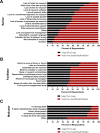Research capacity, motivators and barriers to conducting research among healthcare providers in Tanzania's public health system: a mixed methods study
- PMID: 37670321
- PMCID: PMC10478476
- DOI: 10.1186/s12960-023-00858-w
Research capacity, motivators and barriers to conducting research among healthcare providers in Tanzania's public health system: a mixed methods study
Abstract
Background: Building health research capacity in low- and middle-income countries is essential to achieving universal access to safe, high-quality healthcare. It can enable healthcare workers to conduct locally relevant research and apply findings to strengthen their health delivery systems. However, lack of funding, experience, know-how, and weak research infrastructures hinders their ability. Understanding research capacity, engagement, and contextual factors that either promote or obstruct research efforts by healthcare workers can inform national strategies aimed at building research capacity.
Methods: We used a convergent mixed-methods study design to understand research capacity and research engagement of healthcare workers in Tanzania's public health system, including the barriers, motivators, and facilitators to conducting research. Our sample included 462 randomly selected healthcare workers from 45 facilities. We conducted surveys and interviews to capture data in five categories: (1) healthcare workers research capacity; (2) research engagement; (3) barriers, motivators, and facilitators; (4) interest in conducting research; and (5) institutional research capacity. We assessed quantitative and qualitative data using frequency and thematic analysis, respectively; we merged the data to identify recurring and unifying concepts.
Results: Respondents reported low experience and confidence in quantitative (34% and 28.7%, respectively) and qualitative research methods (34.5% and 19.6%, respectively). Less than half (44%) of healthcare workers engaged in research. Engagement in research was positively associated with: working at a District Hospital or above (p = 0.006), having a university degree or more (p = 0.007), and previous research experience (p = 0.001); it was negatively associated with female sex (p = 0.033). Barriers to conducting research included lack of research funding, time, skills, opportunities to practice, and research infrastructure. Motivators and facilitators included a desire to address health problems, professional development, and local and international collaborations. Almost all healthcare workers (92%) indicated interest in building their research capacity.
Conclusion: Individual and institutional research capacity and engagement among healthcare workers in Tanzania is low, despite high interest for capacity building. We propose a fourfold pathway for building research capacity in Tanzania through (1) high-quality research training and mentorship; (2) strengthening research infrastructure, funding, and coordination; (3) implementing policies and strategies that stimulate engagement; and (4) strengthening local and international collaborations.
Keywords: Barriers; Engagement; Healthcare providers; Motivators; Research capacity; Tanzania.
© 2023. BioMed Central Ltd., part of Springer Nature.
Conflict of interest statement
The Program in Global Surgery and Social Change and the Center for Reforms, Innovation, Health Policies and Implementation Research received funding from the GE Foundation for this study. James T. Kengia, Ntuli A. Kapologwe, Cindy Chwa, Tuna Cem Hayirli, Albino Kalolo, Ally Kinyaga, Noor Zanial and Shehnaz Alidina had financial support from GE Foundation for the submitted work. Tuna Cem Hayirli is also supported by award Number T32GM007753 and T32GM144273 from the National Institute of General Medical Sciences. David Barash is employed by GE Foundation, which funded this work. James T. Kengia and Ntuli A. Kapologwe are employed by the President’s Office Regional Administration and Local Government (PO-RALG). Steven J. Staffa, and John Meara have nothing to declare. The authors have had no financial relationships with any organizations that might have an interest in the submitted work in the previous three years and no other relationships or activities that could appear to have influenced the submitted work.
Figures
References
Publication types
MeSH terms
Grants and funding
LinkOut - more resources
Full Text Sources



